Description
Tulsi in India is ubiquitous in hindu tradition. Tulsi is derived from a Sanskrit word, which means “matchless one”. Tulsi is just not implicated in the ayurvedic medicine but also in other medicinal systems like in Greek, Roman and Unani. Its scientific name is Ocimum Sanctum.
It is grown in warm and tropical areas. Tulsi grows fragrantly, erect and with several branches. It can carry the height up to 30 to 60 cm on its maturity. The leaves of the plants are simple, elliptic, oblong with obtuse or acute, entire or subserrate margins. These are present on opposite sites. The leaves of the tulsi are filled with scents as it smells very good. These can be of 5 cm. The flowers of the tulsi are so small with elongated racemes present as in close whorls. These are of purple color. The fruits are very small and seeds are of reddish yellow color.
General Description
Plants are very important source of medicines and drugs. In the plants species or genera, having medicinal properties, genus ocimum which belongs to the lamiaeae family are very important due to their therapeutic actions. Ocimum sanctum consists of two varieties: the black one also known as Krishna tulsi and green known as rama tulsi. Tulsi is a Sanskrit word which means “matchless one”.
Tulsi is very old in the medicinal field. It is used for its therapeutic properties since 4000 to 5000 B.C. in rigveda, its reference is present that is in 3500 to 1600 B.C old. It is known as queen of herbs.
This plants is known to have hypoglycemic, smooth muscle relaxant, cardiac depressant, antifertility, adaptogenic, immunomodulator, antibacterial, antifungal, antiviral, anti -diabetic, wound healing, anti-oxidant, genotoxic, anti-carcinogenic, radio-protective, neuro-protective, immunological, contraceptive, cardio-protective and lavricidal properties.
Tulsi is enriched with various phytochemicals. The leaves of the plant contains volatile oil 71% eugenol and 20 % methyl eugenol. The fresh plant parts contain phenolic compounds like isothymusin, apigenin, circimaritin, cirsilineol, rosameric acid. These also consistes of two flavonoids: orientin and vicenin, luteolin, apigenin-7-O-glucuronide, Ursolic acid, apigenin, luteolin-7-O glucuronide, orientin, molludistin, sesquiterpenes and monoterpenes such as elemene, neral, alpha and beta- pinenes, camphene, campesterol, cholesterol, stigmasterol and sitosterol. The essential oil of the plant also contains hydrocarbon caryophyllene4, carvacrol, aplpha, beta-pinene, myrecene, limocene, octane, benzene, p-cymene, terpenol, borneol, cuparene, iedol, elemene, sesquiterpine and more. It also contain vitamins like vitamin C, carotene and minerals like calcium, phosphorus, copper, chromium, zinc, iron, nickel and insoluble oxalate.
Classification
- Kingdom – Plantae
- Subkingdom – Viridiplantae
- Infrakingdom – Streptophyta
- Superdivision – Embryophyta
- Division – Tracheophyta
- Subdivision – Spermatophytina
- Class – Magnoliopsida
- Superorder – Asteranae
- Order – Lamiales
- Family – Lamiaceae
- Genus – Ocimum
- Species – Sanctum
Habitat
It is present in the Himalayas up to 1800 meters above the sea level. It is also grown in all over the country and islands also. It grows abundantly in Malaysia, Australia, West Africa and some of the Arab countries. It is also found in Gir Wildlife Sanctuary and Sasangir National Park.
Ayurvedic Properties
| Hindi / Sanskrit | English | ||
| Rasa | Katu, Tikta | Taste | Pungent, Bitter |
| Guna | Laghu, Rooksha, Teekshna | Physical Property | Light, Dry, Piercing |
| Virya | Ushna | Potency | Hot |
| Vipaka | Katu | Metabolic Property (After Digestion) | Pungent |
Effects On Doshas
It helps to balances vata and kapha doshas. It helps to increase pitta dosha.
Classical Categorization
| Charak Samhita | Vagbhata | Sushrut Samhita |
| Svasahara gana | Surasadi gana | Surasadi gana |
Practical Uses Of Tulsi
Tulsi show numerous medical properties. It helps to treat cancers, ulcers, inflammations, liver problems and many more.
ANTI-STRESS PROPERTIES
The vitamins like vitamin C and other antioxidants like camphene, repairs free radicals damage and minimizes the stress caused by these free radicals. It helps to calm blood pressure, nerves and inflammation thus reduces stress.
ACTS AGAINST RESPIRATORY DISORDERS
The components in essential oil of tulsi plant such as Camphene, Eugenol and Cineole, help to treat problems like asthma, cold and cough, influenza and other problems like bronchitis. In the problem of asthma it is very helpful since it relieves congestion and facilitates smoother breathing.
AGAINST LUNG DISEASES
The phytochemicals in tulsi such as Camphene, Eugenol, vitamin C and Cineole mediate their action against congestion, lung infections and shows healing of lung due to problems like tuberculosis, smoking and lung cancer.
ORAL HEALTH
Tulsi shows the activities of oral disinfectant and mouth freshener. The chemical components present in it kills approximately 99% of the mouth germs and bacteria that can cause dental cavities, tartar, bad breath and plaque. This is also effective against mouth ulcers.
ANTI-MICROBIAL ACTIVITIES
It is helpful in treating many of germs, bacteria, virus and fungal infections. Diseases like malaria, typhoid, flu, any kind of fungus, gonorrhea etc. can be cured by the effects of tulsi.
ANTI-CANCER PROPERTIES
Phytochemicals in tulsi leaves such as Eugenol and more other shows modulatory effect against carcinogen metabolic enzymes. Kidney problems
Tulsi acts as a detoxifier and diuretic so helps to reduce uric acid level, urination levels and dissolution of kidney stones.
HEADACHES AND FEVER
Headaches due to migraines, cold and cough or high blood pressure can be cured by tulsi. Tulsi helps to cure that microbial infections and hence treats fever.
HEART PROBLEMS
Vitamin C and antioxidants like eugenol protects heart from free radicals and lowers the level of cholesterol.
OTHER FUNCTIONS
Tulsi helps to treat various skin infections like dryness and pimples. Tulsi phytochemicals like vitamins and other nutrients protects body from free radicals, hazardous byproducts of cellular metabolism. So helps to regain health and avoid premature aging.
It also soothe eyes, reduces inflammation and stress and gives relief from conjunctivitis, boils and many other problems of the eyes.
Parts Used
Leaves, Roots, Seeds
Dosage
- Root decoction – 50 to 100 ml
- Seeds powder – 3 to 6 g
- Fresh juice – 10 to 20 ml


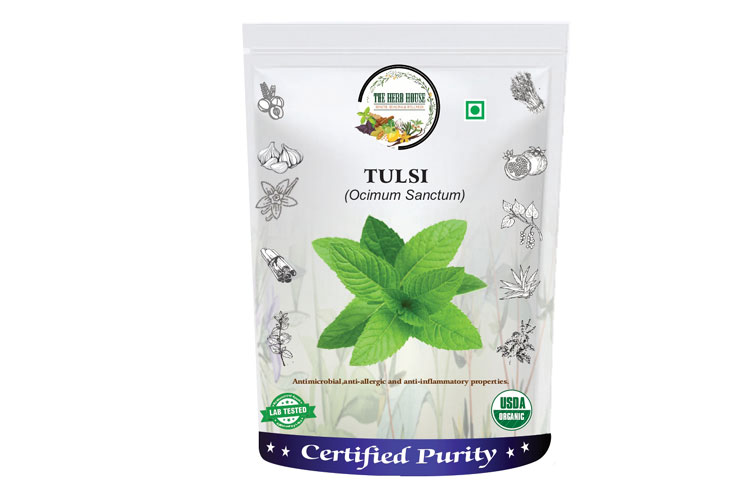
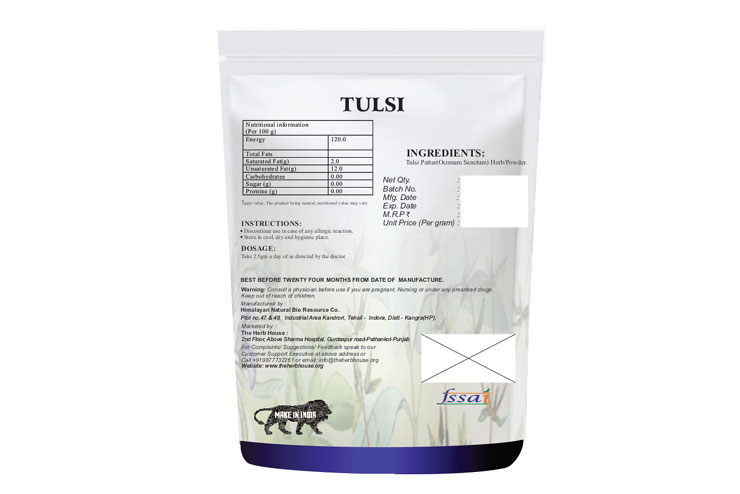
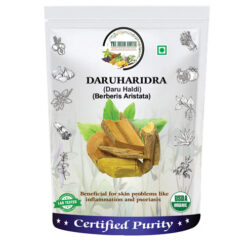
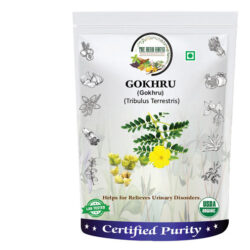
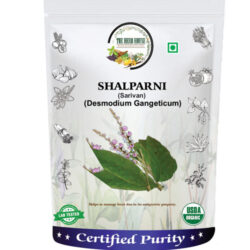
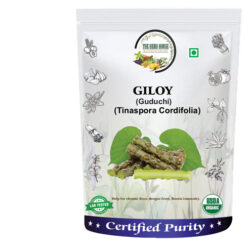
Reviews
There are no reviews yet.